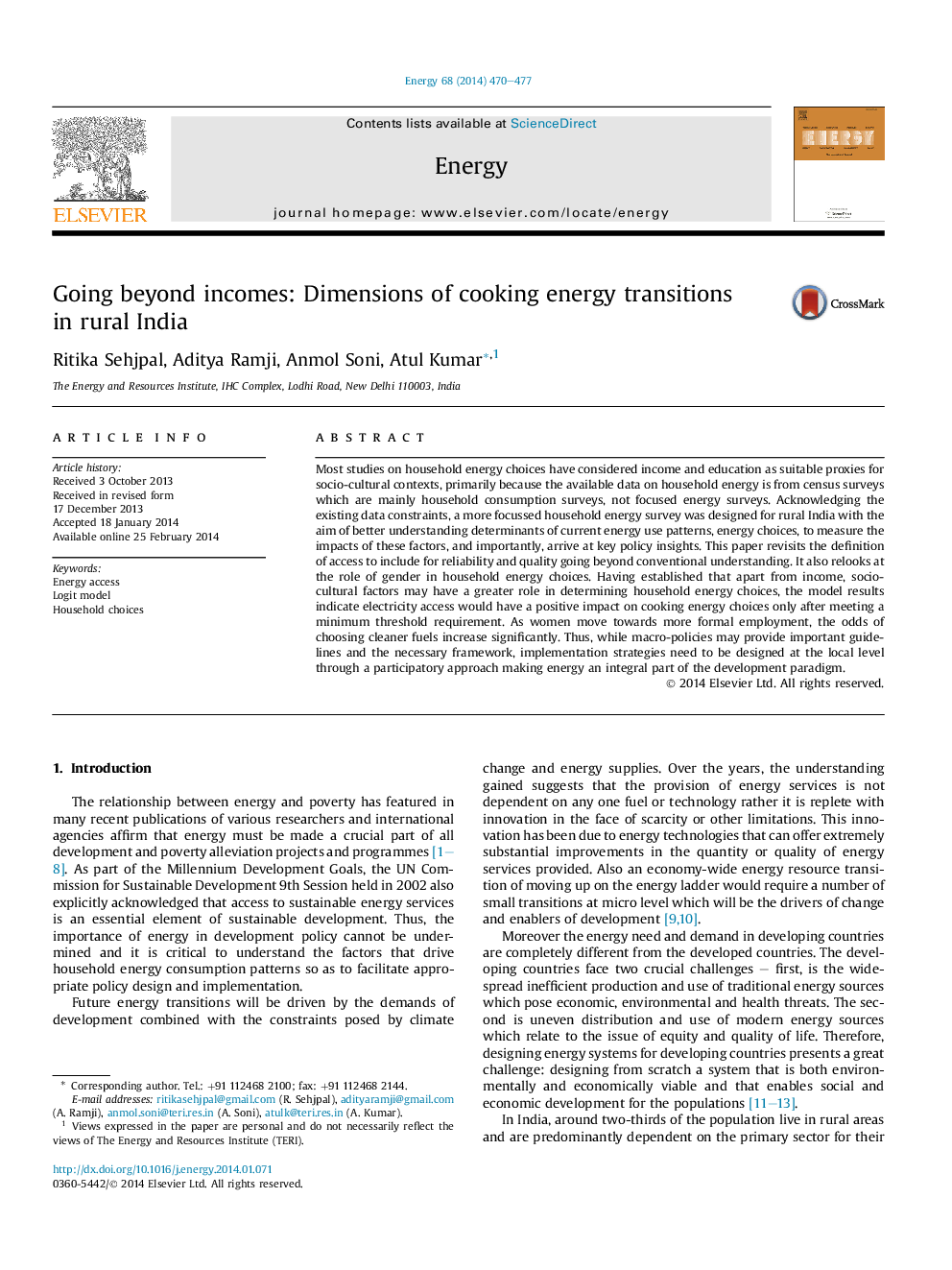| کد مقاله | کد نشریه | سال انتشار | مقاله انگلیسی | نسخه تمام متن |
|---|---|---|---|---|
| 8078115 | 1521478 | 2014 | 8 صفحه PDF | دانلود رایگان |
عنوان انگلیسی مقاله ISI
Going beyond incomes: Dimensions of cooking energy transitions in rural India
ترجمه فارسی عنوان
رفتن بیش از حد درآمد: ابعاد انتقال انرژی پخت و پز در هندوستان روستایی
دانلود مقاله + سفارش ترجمه
دانلود مقاله ISI انگلیسی
رایگان برای ایرانیان
ترجمه چکیده
اکثر مطالعات در مورد انتخاب انرژی خانوار درآمد و آموزش را به عنوان پروکسی مناسب برای زمینه های اجتماعی و فرهنگی در نظر می گیرند، عمدتا به این دلیل که داده های موجود در مورد انرژی خانوار از نظرسنجی های سرشماری است که عمدتا نظرسنجی مصرف خانوار است، نه بررسی های انرژی متمرکز شده. با توجه به محدودیت های موجود موجود، تحقیق بیشتر در زمینه انرژی خانوار برای هندوستان روستایی به منظور درک بهتر عوامل تعیین کننده الگوهای مصرف انرژی فعلی، انتخاب انرژی، برای اندازه گیری تأثیرات این عوامل و مهمتر از همه، به دیدگاه های کلیدی سیاست می رسد. این مقاله مجددا تعریفی از دسترسی را برای اطمینان و کیفیت ارائه می دهد که فراتر از درک متعارف است. همچنین در نقش جنسیت در انتخاب انرژی خانوار نقش دارد. پس از تعیین شده است که صرف نظر از درآمد، عوامل اجتماعی-فرهنگی ممکن است نقش تعیین کننده ای در انتخاب انرژی خانوار داشته باشد. نتایج این مدل نشان می دهد که دسترسی به برق تنها پس از رعایت حداقل آستانه، تاثیر مثبت بر انتخاب انرژی دارد. همانطور که زنان به سمت استخدام رسمی تر حرکت می کنند، شانس انتخاب سوخت پاک تر به میزان قابل توجهی افزایش می یابد. بنابراین، در حالی که سیاست های کلان ممکن است دستورالعمل های مهم و چارچوب لازم را فراهم کند، استراتژی های اجرایی باید در سطح محلی از طریق یک روش مشارکتی طراحی شوند که انرژی را بخشی جدایی ناپذیر از پارادایم توسعه می داند.
موضوعات مرتبط
مهندسی و علوم پایه
مهندسی انرژی
انرژی (عمومی)
چکیده انگلیسی
Most studies on household energy choices have considered income and education as suitable proxies for socio-cultural contexts, primarily because the available data on household energy is from census surveys which are mainly household consumption surveys, not focused energy surveys. Acknowledging the existing data constraints, a more focussed household energy survey was designed for rural India with the aim of better understanding determinants of current energy use patterns, energy choices, to measure the impacts of these factors, and importantly, arrive at key policy insights. This paper revisits the definition of access to include for reliability and quality going beyond conventional understanding. It also relooks at the role of gender in household energy choices. Having established that apart from income, socio-cultural factors may have a greater role in determining household energy choices, the model results indicate electricity access would have a positive impact on cooking energy choices only after meeting a minimum threshold requirement. As women move towards more formal employment, the odds of choosing cleaner fuels increase significantly. Thus, while macro-policies may provide important guidelines and the necessary framework, implementation strategies need to be designed at the local level through a participatory approach making energy an integral part of the development paradigm.
ناشر
Database: Elsevier - ScienceDirect (ساینس دایرکت)
Journal: Energy - Volume 68, 15 April 2014, Pages 470-477
Journal: Energy - Volume 68, 15 April 2014, Pages 470-477
نویسندگان
Ritika Sehjpal, Aditya Ramji, Anmol Soni, Atul Kumar,
